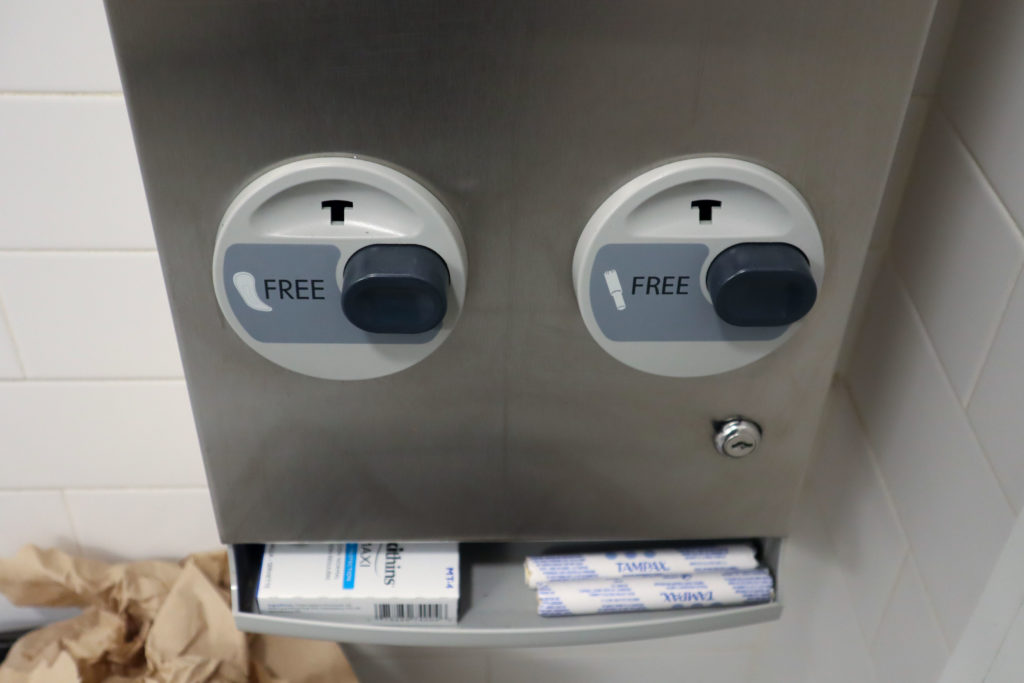Officials have installed free menstrual product dispensers in at least 28 buildings as of Friday, more than quadruple the number of dispensers present in campus bathrooms in February.
The University installed dispensers for free pads and tampons in all 24 buildings with academic and dining space on Foggy Bottom and all four buildings on the Mount Vernon Campus The Hatchet checked Thursday and Friday after a Hatchet analysis in February found dispensers in just nine of 29 campus buildings inspected. The new menstrual product dispensers put GW in line with a year-old D.C. law that requires private, public and charter schools in the District to provide free menstrual product dispensers in female and gender-neutral bathrooms.
The Expanding Student Access to Period Products Emergency Act, which was proposed by Ward 2 Council member Brooke Pinto last January and codified by Congress last March, mandates universities to stock dispensers with “sufficient period products to meet the needs of students at all times throughout the calendar year.”
Dispensers were stocked with pads and tampons in 73 of 127 dispensers, while 54 were partially or completely lacking period products, with no pads in 19 dispensers and no tampons in 13, according to a Thursday and Friday Hatchet analysis of menstrual product dispensers on campus. A total of 22 dispensers did not have pads or tampons, including those in all five of the bathrooms in Corcoran Hall.
The Hatchet did not have GWorld tap access to enter Lisner Hall.
University spokesperson Julia Metjian said Friday that the University finished installing dispensers in all public all-use and women’s restrooms in buildings owned by GW by the end of March. She said GW Facilities staff workers check dispensers weekly and fill them “as needed.”
“All dispensers were installed by the end of March and were stocked no later than the middle of April,” Metjian said in an email.
She said the University ordered the dispensers from HD Supply, an industrial distributor, to meet the Americans with Disabilities Act “standard” for the dispenser buttons, including raised buttons that are “easier” to use.
KC Costanzo, a GW Facilities customer engagement and service enhancement associate, said the University installed 366 dispensers across the Foggy Bottom, Mount Vernon and Virginia Science and Technology Campuses in a statement earlier this month. Metjian said the University ordered 400 dispensers in February and added Friday that officials have placed the remaining dispensers in storage for future use or to replace the current units.
More than half a dozen students said they noticed the dispensers were out of stock but that free period products help students who could not otherwise afford them.
Juli Camacho, a senior majoring in international affairs, said she tried to use a tampon from a dispenser once for class, but the dispenser was unstocked. She said the University’s installation of period dispensers was “good,” but officials should ensure dispensers are always filled with products for students to use.
“If you’re going to install something and not have it stocked, that doesn’t solve anything,” Camacho said.
Rindi Tobin—a junior majoring in cognitive neuroscience and the co-president of Clearminds, a student wellness organization—said the University’s implementation of the dispensers was “overdue” but a push in the “right direction.”
Tobin said she believes officials should display general information on the front side of the dispensers pertaining to using the period products stocked in the dispensers and information teaching students about toxic shock syndrome—a life-threatening bacterial infection sometimes caused by leaving tampons in too long.
Metjian said in February officials would install signage in University restrooms, but Costanzo said earlier this month that the University would not install signage because the requirement only pertains to D.C. public schools. Pinto’s bill requires the Office of the State Superintendent of Education, which oversees K-12 schools in the District, to develop an 8.5 by 11-inch sign that includes medically accurate information on the safe use and disposal of menstrual products to display near the dispensers in consultation with the D.C. Department of Health.
“Sometimes, it’s just a helpful reminder, especially when it comes to tampons,” Tobin said.
Alex Lehrer, a freshman studying communications, said she has seen the dispensers “everywhere” on campus but noticed an initial delay in stocking them with products. She said free dispensers make products more accessible to students than coin-operated dispensers installed in some bathrooms on campus because many students do not carry change with them when using the bathroom.
“I don’t walk around with quarters on me, so it just like makes it more accessible,” Lehrer said.
Annika Vasagiri, a freshman majoring in international affairs, said she took a pad from the dispenser once “in case” she needed one in the future but has not used the pads. She said the dispensers are helpful for students who cannot otherwise afford period products and convenient for those who may forget to carry their own.
“I could definitely foresee a situation where I forgot or I didn’t bring my backpack with me somewhere,” Vasagiri said. “It could definitely happen in the future.”
Anna Zell, Anna Fattizzo, Fiona Riley, Lindsay Larson, Max Porter and Nora Fitzgerald contributed reporting.










